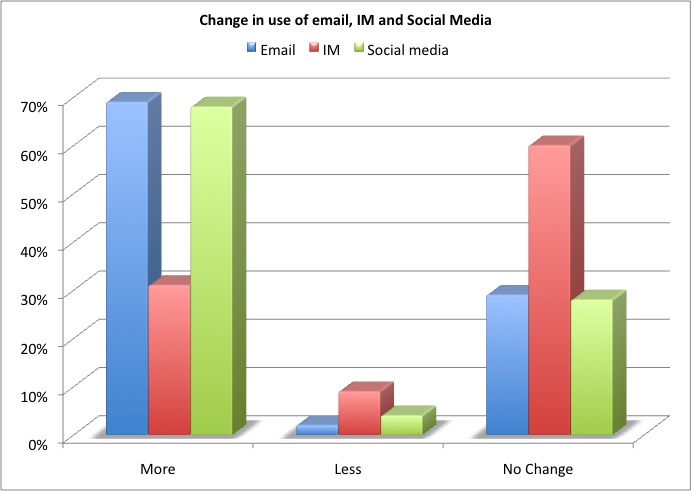
Empty Wardrobe – Empty Inbox
2012 saw the volume for email traffic rise by at least 10% and certainly my inbox is starting to bulge again. Email overload is rising (and hence email stress its direct descendant). Do I declare inbox bankruptcy like so many before me. The only trouble is that unlike a bank there is no bale out if I lose a valuable email. Yesterday I spent four hours clearing out my sent items and lots of old folders. It felt just like clearing out the wardrobe of all those old clothes which one hangs onto just in case either they come back into fashion or you lose some weight so once more you can get into those skinny fit jeans!
In the case of the inbox it was old projects and possible joint ventures which had long since past their sell by date.
As a result here are my top tips and indeed my own goals for limiting the effects of email overload and email induced stress.
What are your goals and plans for 2013 to help you save time and unchain yourself from the inbox?
Do you need some help slimming down your inbox for 2013? Call us and we can discuss how our Brilliant Email Management workshops and coaching can help you and your business. Alternatively, subscribe to our free monthly e-briefing.
Tags: Brilliant Email, Email Bankruptcy, email management training, email overload, email stress, empty inbox, Imrpoved personal productivity, new year's resolutions

Email bullying?
In the USA, October is national prevent bullying month. We do not appear to have anything similar in the UK which is a shame especially as there have been a few cases of young people committing suicide through feeling bullied on Facebook etc.
Email too can easily be used to bully people. For example leaving insufficient time to reply, constantly sending email reminders and demands. Sending rude, arrogant and abrasive emails can be stressful too for the recipient. Attaching read receipt and reminder flags might also be deemed bully tactics. Such harassment is a drain on productivity as found previously. Perhaps the most serious form of email bullying is expecting people to reply too quickly and often outside acceptable working hours. Moreover, email bullying adds to the email overload and hence stress levels.
Any form of bullying is to be deplored and is unacceptable. Social technologies and email have just made it easier to do in a hidden and often covert manner. Deleting and/or ignoring such emails is not an option.
VW recently stopped sending email to workers Blackberrys thirty minutes after their shift ended. That is taking a sledge hammer to crack a nut.
At Mesmo Consultancy we have found a more informed a sustainable solution is to implement a proper email management code of conduct and email best practice charter. It should contain both what is acceptable email behaviour and the procedure if you are on the receiving end of email bullying.
Have you ever been bullied by email? Does your organisation have such an email management code of conduct?
Tags: corporate email etiquette, email best practice, email bullying, email management, email response times, email stress, Mesmo Consultancy
The CIPD annual survey for well being shows that sick leave has fallen by nearly a day. Good news. The bad news is that stress and muscular skeletal problems (back pain RSI and eye strain) are two of the main reason for taking sick leave. Indeed cases of ‘ipad shoulder’ have now been reported. Email overload is still a major contributor to stress levels, not to mention the time spent at the inbox slumped over a keyboard which rises the risk of muscular skeletal problems.
Some postulate that email is in decline and hence we might hope that is email overload and it’s twin sister ’email stress’. The main reason given for the decline in email is the rise in use of social technologies like SharePoint, instant messaging (IM) and alike.
email is the rise in use of social technologies like SharePoint, instant messaging (IM) and alike.
Our recent survey on the ‘state of the inbox’ for the ITDF Autumn Conference revealed that email traffic is far from declining. Mesmo Consultancy like others are witnessing a dramatic increase. Business users now receive on average 77 emails per day which represents a rise of 26% over the last few years. Interestingly however, most feel that only 47% of these emails are necessary. Dealing with the unnecessary emails (excluding spam) is now costing organisations nearer 31 days per person per year in comparison to the 21 we witnessed a few years ago. So much for the push to lean and mean and improved efficiency.
Is your organisation paying too high a price for the pleasure of using email? Click here to check how much email overload is costing you in lost productivity.
So what of all the talk about social technologies being the nirvana to solve all the challenges which email possess? Our study revealed that about half the participants are using such technologies but they are not truly embedded in many as a replacement for email. Discussions at the ITDF supported this finding.

Haystacks by Monet
Social technologies bring with them their own set of challenges not least more emails as alerts to new postings etc. Then there is the information overload as more people feel they must share ever more information. It takes a skilled knowledge worker to pick out and pull in just what is really relevant. It’s akin to finding a needle in a haystack and is a skill few either possess or are taught.
Piling social technologies on top of email is not the solution. It just adds to the information overload and ramps up even further the stress and time we need to spend slumped over our keyboard.
One solution to driving down stress related sick leave is to implement such technologies as part of the information and communications strategy. However users must also be properly educate about when, where and how to use these technologies and email properly. Not surprisingly less than a third had any education and training in how to use effectively email and social technologies. (This is very similar to previous findings.)
We have commented on the effective use of IM and there will be more in the next blog. Meanwhile, we would be delighted to talk to you about how we can help you drive down and out the pernicious 21st century office disease of email overload and the associated stress.
Our current research into the future of email reveals that information overload is increasing. What is your organisation doing to help people use email and social technologies effectively to reduce email and information overload and hence time wasted at the computer?
Tags: email management training, email overload, email stress, future of email, Instant messaging, Mesmo Consultancy, social technologies
If you still have any doubts about the extent of email overload take a look at this recent Infographics from Online It Degree. Email is now the biggest drain on our own and our collegues productivity. Mesmo Consulatncy’s own data collection from our clients shows that we waste up to 21 days per person per year. Moreover email overload is often a major cause of stress. Figures from the USA now show that absenteeism through stress in rising.
Created by: OnlineITDegree.net
However investing ninety mintes of your time in one of our Brilliant Email Master classes has helped many business reclaim up to 45 mintes of the time lost through email overload.
Dr Monica Seeley, founder of Mesmo Consultancy has spent the last fifteen years coaching and training people from a wide range of organisations and businesses to use email more effectively to improve personal and business performance and manage the risk associated with cyber crime. Monica is a Visiting Senior Fellow at Cass Business School City University and Bournemouth University Business School. She is passionate about helping people to save time by using email effectively and has written several books on the subject, the latest being Brilliant Email. She runs regular workshops and masterclasses on email best practice.
Tags: email management training, email overload, email stress
Managing change follows the same seven step process show below no matter what you try to change – from the simple, moving desks to the more complesx, changing email behavior.

Tags: email best practice, email management, email overload, email stress